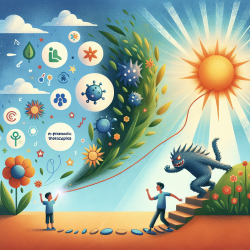Introduction
Chronic refractory cough is a condition that significantly impacts the quality of life, causing not only physical discomfort but also psychological and social burdens. Traditional pharmacologic treatments often come with adverse effects, prompting the exploration of non-pharmacologic therapies. The research article "Management of non-pharmacologic therapy for chronic refractory cough: Mechanism, composition, applicable population, and assessment" sheds light on the potential of non-pharmacologic interventions, particularly physiotherapy and speech and language therapy, in managing this condition effectively.
Understanding Non-Pharmacologic Therapy
Non-pharmacologic therapy, as discussed in the research, primarily involves physiotherapy and speech and language interventions (PSALI). These therapies focus on behavioral interventions to treat chronic cough, offering a holistic approach that includes maintaining throat hygiene, laryngeal massage, and psychoeducational counseling. The absence of adverse effects makes these therapies particularly appealing for long-term management.
Mechanisms of Action
- Inhibition of Heightened Cough Sensitivity: Non-pharmacologic therapies help in reducing peripheral cough sensitivity by maintaining laryngeal hydration and performing laryngeal massage, which increases the cough reflex threshold.
- Laryngeal Hypersensitivity Reaction: These therapies aim to reduce laryngeal hypersensitivity, thereby minimizing the risk of vocal cord dysfunction and muscle spasms.
- Automatic Control and Inhibition of Coughing: Through psychoeducational counseling and cough suppression techniques, patients can gain better control over their cough reflex, enhancing their ability to suppress coughing.
Implementing Non-Pharmacologic Therapy in Practice
For practitioners, integrating non-pharmacologic therapy into treatment plans can be transformative. Here are some steps to consider:
- Education: Educate patients about the mechanisms of chronic cough and the benefits of non-pharmacologic therapy to enhance compliance and participation.
- Cough Suppression Techniques: Teach patients to identify cough triggers and use strategies such as swallowing or distraction to suppress the urge to cough.
- Breathing Exercises: Incorporate exercises that focus on abdominal and diaphragm breathing to reduce laryngeal muscle tension.
- Psychoeducational Counseling: Address psychological factors such as anxiety and depression that may exacerbate coughing.
Encouraging Further Research
While current research highlights the efficacy of non-pharmacologic therapy, there is a need for larger, more comprehensive studies to explore its long-term benefits and mechanisms. Practitioners are encouraged to contribute to this growing body of research, exploring innovative approaches and combinations of therapies to optimize outcomes for patients with chronic refractory cough.
Conclusion
Non-pharmacologic therapy offers a promising avenue for managing chronic refractory cough, with the potential to significantly improve patients' quality of life without the adverse effects associated with pharmacologic treatments. By embracing these therapies, practitioners can empower patients to take control of their condition, fostering better health outcomes.
To read the original research paper, please follow this link: Management of non-pharmacologic therapy for chronic refractory cough: Mechanism, composition, applicable population, and assessment.










